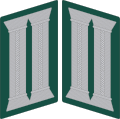Stabsarzt (short: StArzt or SA), in English Staff Surgeon, is a military commissioned officer rank in German speaking armed forces. In the German Bundeswehr and the former Wehrmacht and Reichswehr, it describes a qualified or licensed surgeon or dentist who practises military medicine, with a rank equal to captain (German: Hauptmann) in the army and the air force or lieutenant (German: Kapitänleutnant) in the navy. In the Austrian and Swiss armies, the rank is Hauptmann.
Contents
This rank corresponds to NATO code OF2, and is known in English as captain (Dr.) for army or air force officers or lieutenant (Dr.) for naval officers. The rank was historically also used in the Austro-Hungarian Common Army and corresponded to major or the NATO code OF-3, known as major (Dr.) in English.
The German word Arzt is the general term for a medical practitioner in German. In English the word surgeon in a military context is applied to any medical practitioner, due to the historical evolution of the term, and does not refer exclusively to the modern specialty of surgery. Thus the title is translated as Staff Surgeon in English. The rank of Staff Surgeon has also existed in English-speaking countries; it was used in the Royal Navy of the United Kingdom until 1918. [1]
Holders of this rank are commissioned officers; in practice their authority is often limited to medical matters and medical staff (such as other doctors, nurses and other medics working under their supervision). Under international humanitarian law (specifically the First and Second Geneva Conventions) they are regarded as neutral non-combatants and accorded the status of "protected persons" when participating in humanitarian work during armed conflicts, such as caring for the sick or wounded. They may wear the red cross as a protective sign. As such, they may not be attacked, harmed or taken as prisoners of war (attacking medical personnel is a war crime), and are entitled under the Geneva Conventions to carry out their work without being inhibited. They may be armed, usually with service pistols, strictly for defensive purposes, including self defense and the defense of patients.
| |||
| Rank insignia | German medical service ranks | ||
| Introduction | |||
| Rank group | Commissioned officers | ||
| Heer/Luftwaffe Marine | *Stabsarzt *Stabsapotheker *Stabsveterinär | ||
| short (in lists) | *StArzt (SA) *StApotheker (SAP) *StVeterinär (SV) | ||
| NATO equivalent | OF-2 | ||



















